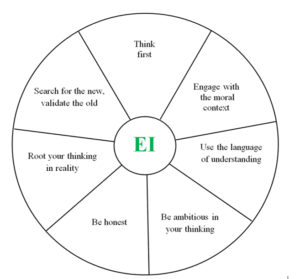Ethical intelligence is the ability to make ethical decisions when faced with moral challenges or dilemmas. We are faced with such challenges every day of our working lives. Sometimes we are unaware of the moral subtext to our actions, but on closer inspection, all social transactions reveal a moral aspect. Is the transaction fair? Is the influence being exerted by one person over another due to their respective positions or roles, nurturing or exploitative? Are we manipulative or collaborative in our relationships with colleagues or clients? Are we being entirely honest?
Ethical assessment presupposes an agreed code of ethics. For the purposes of this series I have taken three straightforward and uncontroversial moral objectives as the basis for this:
On these foundations, we can build a structure of policies and practices which can be seen to be moral. We can assess potential actions and decisions on the basis of their compliance with these aims.
But even with such straightforward central principles, we all know that moral quandaries are often difficult to resolve. Are there techniques which can help? Are there methods which can assist us in achieving sound moral judgement?
In my book Ethical Intelligence, I identify seven techniques for clear and decisive ethical thinking.

Let’s consider each in turn.
We are living in a world which confronts us on a daily basis with enormous quantities of information. The flood of opinion, advice, assertion and spin can at times seem overwhelming.
So, we need to be pre-emptive. We need to get our thinking done before the ‘cognitive imperialism’ of others exerts its dominance. We must be ultra-analytical about the data being provided to us. We must ask questions such as, ‘Who benefits from my agreeing with or believing this information?’ ‘What are the motives underlying this message or instruction?’ ‘What’s the big picture?’
This is particularly important in the age of big data and algorithmic marketing (of both products and ideas).
Our mantra must be: Think first before someone or something – be it a person, algorithm or AI – does your thinking for you.
Everything we do sits within a moral context. Morality tells us which actions or decisions are good or bad. Therefore, no action or inaction sits outside of this.
So, we must always ask of ourselves, ‘How does what we are choosing to do or being asked to undertake, tie in with being moral, with having integrity, with doing good?’
Embedding our thinking and decision-making in the moral context, and keeping our ethical objectives at the forefront of our consciousness, is a key signifier in developing our ethical IQ.
Pre Emptive Thought – Think First or someone else will do your thinking for you

In Ethical Intelligence I emphasise the importance of using the thought patterns and language of understanding. Understanding has an in-built implication of tolerance. It encourages communication rather than the manipulative use of words to coerce or control. Understanding is collaborative. It suggests that together we can achieve mutual understanding. Should we disagree, we can reassess the basis of our understanding, the evidence supporting it, and reach an improved understanding on which we can agree.
Understanding is non-threatening, non-conflictual and inclusive. It uses language such as “Help me understand…” Or “My understanding is this…” Or “With the information I have so far it looks as if…” Or “Please explain…”
Understanding is ethical because it places knowledge outside of ourselves, as something to which all of us are equally able to aspire.
Ethical intelligence is not passive. It challenges the present. It challenges tradition, habit and routine. It asks, ‘Why stick with how things are or the way it’s always been?’
Our society has accomplished wonders – and we’ve only just begun. Why not go further, creating the unusual, the astounding, the original, the unique? Why not seek new and ethical solutions to old and unresolved problems? Why not turn our world around and make it work in brand new ways?
Honesty, as noted earlier in this series, is integral to morality. It is crucial that we value honesty in our thinking, our words and our actions. And we must also value honesty in the words and actions of others: our colleagues, our managers, and in those who work for us. It is elemental moral logic that a dishonest person cannot be moral. No one has integrity if they lie. A dishonest person is almost by definition a person who will eventually let you down. And dishonesty quite clearly conflicts with our moral aims to nurture those around us, to nurture our community as a whole.
An essential aspect of the thought pattern of understanding is its basis in evidence and fact. The more closely our personal ‘map of the world’ meshes with reality, the more empowered we are in owning our actions, in understanding what is influencing us, in controlling this influence… and in being able to contribute ethically to our workplace and world.
Ethics is not relativistic. It is bound by logic, and it assumes a discoverable external reality to which our core moral aims indisputably apply.
The Real World – we live in a pragmatic and practical ‘real world’ to which morality always applies

Lastly, an essential characteristic of understanding is that our understanding can always improve. Knowledge progresses through achieving ever-better descriptions of reality. In the Middle Ages a belief that the surface of the Earth was flat served us well enough; but then we needed to take a further step. We moved to a better understanding which allowed our geographers and explorers to circumnavigate the Earth. Through many such steps, we have created the marvels of the modern world.
Far better, then, in our personal and professional lives, to be alert to new evidence; to be prepared to adapt and improve.
Given these seven disciplines, is it possible to improve the eIQ (Ethical Intelligence Quotient) of our organisation, business or workplace?
Firstly, it is worth noting that eIQ is not a static quality. It is not a case of either having ethical intelligence or not. This is true even of traditional intelligence. Our brains adapt and grow long after our early formative years. See for example the case of London taxi drivers whose memory centres increase in size as they learn to navigate the metropolis. As we undertake new activities our brains ramp up the cognitive areas needed to support these activities. We become cleverer at what we do.
In a similar way, we can enhance and develop our eIQ simply through the application of the disciplines outlined above. If we work hard to be pre-emptive and analytical in our thinking, our capacity for analytical thinking will improve. If we work hard to always embed our assessment and decision-making in the moral context, our brains will get better at doing this. If we exercise the thought patterns of understanding, we will become better able to understand.
Exercise your mind – Our brains adapt throughout our lives. We can always become cleverer at what we do
But how do we apply this to the workplace?
To enhance the ethical intelligence of our organisation or business we must adapt our HR policies, our appraisals methodology and our learning and development protocols to embrace the disciplines outlined above.
In an earlier article, I indicated the key characteristics of the ethical business. One of these was to incorporate our core moral objectives into the mission statement, charter, or articles of our business. This assertion of moral intent, and the publicising of our organisational ethics, is a first step towards embedding our workplace activities within the moral context. But this needs to be reinforced by introducing ethically intelligent thinking as an objective into our appraisals. This can be achieved by including training in ethical intelligence within our L&D portfolio, and by HR taking a leading role in the practice and deployment of eIQ.
If we implement these measures our ability as businesses to act with ethical intelligence and agility, and to participate in the ethical enhancement of the modern workplace, will be ensured.
In my final article in this series, I will discuss how trust can be enhanced within the workplace – and why ethics lies at the heart of this.
About the Author:
Luke Andreski is a writer with over thirty years’ experience in the IT industry, specialising in People Technology implementation projects and change management. More recently he has focused on moral philosophy and psychology, with a particular interest in business leadership and management ethics.
Luke has published two books on ethics: Ethical Intelligence, a guide to effective ethical thinking in a world of polarised belief and political spin; and Intelligent Ethics, exploring the need for ethical change if we are to address the challenges of the 21st Century.
He is currently working in conjunction with Phase 3 on a series of articles investigating Ethics in the Workplace.
For more articles, tips, and advice, make sure to visit our blog .